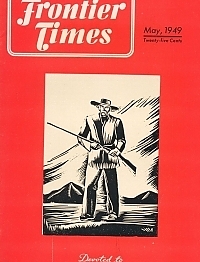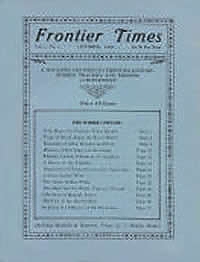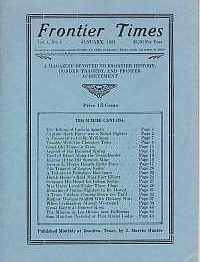By using our website, you agree to the use of cookies as described in our Cookie Policy
Magazines & Instant Downloads
Vol 26 No. 08 - May 1949
Erath's Famous Fight
Late in 1836, in accordance with a previously agreed plan looking to the special protection of Robertson's Colony, Capt. Coleman, in command of ranger forces, proceeded to locate a block house station or log fort about the "Three Forks" of Little River. Lieut. George B. Erath was detailed with a small force to erect the buildings and to protect that point. Of the thrilling events that soon occurred, Erath himself, tells in a graphic narrative contained in this excellent article.
Mentions: Capt. Hill's * Captain Barren * Yegua * Three Forks of Little River * Walnut Creek * Gouldsby Childers * One of the soldiers -- Collins * Col. Coleman * Lieut. McLochlin * Colorado Fort (Coleman's Fort) * Elm Creek * Lee R. Davis, Daniel Clark (an elderly man) Empson Thompson, Jack Gross, Robert Childers, and his boy brother, Frank, Jack Houston (volunteers) John Folks, Lewis and Maurice Moore, Green McCoy * Leishly, a prospector * Lieut. Curtis * Little River Fort * Frank Childers * David Clark *
The Cordova Rebellion
At Nacogdoches early in August, 1838, it was found that a motley company of about 180 citizens, headed by Vincente Cordova, an early, intelligent and somewhat influential Mexican president of the settlement, had secretly taken up arms and encamped on the west bank of the Angelina. On learning these facts, a proclamation was issued to the malcontents requiring them to return to their homes and lay down their arms, under the penalty of being declared enemies of the Republic.
To this proclamation the rebel leaders made the following bold and defiant reply: -- "The citizens of Nacogdoches, being tired of the unjust treatment, and of the usurpation of their rights, can do no less than state that they are embodied, with arms in their hands, to sustain those rights, and those of the nation to which they belong. They are ready to shed the last drop of their blood; and declare as they have heretofore done, that they do not acknowledge the existing laws, through which they are offered guarantees (by the proclamation) for their lives and properties. They only ask that you will not molest their families, promising in good faith to do the same in regard to yours. - Vincente Cordova”
So begins the story of this rebellion and the subsequent event. Here is that story.
Mentions: Nat Morris * J. Arriola * J. Vincente Micheli * A. Cordova * C. Morales * Joshua Robertson * Juan Jose Rodrigues * J. Santos Coy * General Rusk * Directing Major Augustin * Chief Bowles * Commandant Canalizo * Manuel Flores * Gen. Canalizo * Gen. Filisola * Col. Burleson * the Guadalupe bottom * Caldwell's rangers * Captain Matthew Caldwell * Cordova, Maj. Walter * Texas Indian agent, Martin Lacy * Gen. Albert Sidney Johnston
Colonel Crimmins Honored
Colonel Martin L. Crimmins of San Antonio, who has contributed many historical articles to Frontier Times, was recently the recipient of a beautiful tribute by the De Zavala Chapter of the Texas Historical and Landmarks Association in San Antonio. The tribute, written by Mrs. Mary Groce Mackey, a descendent of Col. Jared Ellison Groce, a member of Austin's Colony, was presented by Judge J. M. Woods, direct descendent of James B. Woods, signer of the Texas Declaration of Independence. The tribute, entitled "The Voice of the Lone Star," was as follows:
"If the Lone Star in our Texas flag could speak it would tell of the dreams and sacrifices of the men who died in the Alamo, the prayers of the men betrayed at Goliad, the songs and deeds of the patriots who marched at San Jacinto, and of the countless men and women who gave their lives that Texas might survive. Heroes all Texas will remember! In this era the scene changes, but men fight on to preserve freedom, the right to expand, and for the peace of fellowmen. We Texans are a friendly people and grateful for the many blessings bestowed upon us. We are fortunate in having with us a man from a distant state, who came and gathered our people into his heart. His life is dedicated in preserving the history of our state, the deeds of our heroes, and in alleviating the sufferings of mankind. Today in appreciation, through the descendants of the brave men and women who, with faith in God, pioneered into a wilderness and laid the foundation for this great State, Texas extends her friendly hand in welcome to a distinguished adopted son, soldier, author, gentleman and friend, Colonel Martin L. Crimmins."
Stephen F. Austin Left In Shadow
“Every school pupil in Texas knows that Stephen Fuller Austin was the father of Texas. Nevertheless, he is seen today rather dimly through the smoke that arose from the funeral pyres at Goliad and in Alamo plaza and through the blue smoke of Houston's muskets at San Jacinto. He stands in the shadow of the more eye-impelling deeds of the soldiers—Houston, Bowie, Crocket, Travis Fannin, Bonham, Milam and the others. So far as popular history is concerned, Austin had the misfortune to do a slightly prosaic job and to do it well without the ruffle of drums and the blast of trumpets.” Here is his story
Mentions: Stephen F. Austin was born in Wythe County, Virginia, Nov. 3, 1793 * Timber Ridge * Col. Mexia * Mexican general, Cos * Battle of Concepcion *
Old Fort Parker
R. F. Mattinson, Senior Editor of Groesbeck Argus, 1875
The following biographical sketch has been kindly furnished us by Mr. Anglin, with the privilege of using it as we choose. We give it almost in his own language, and no one who knows him will doubt his statements. Abram Anglin was born in Kentucky, December 28, 1817. His father moved to Illinois when he was one year old, and came to Texas in 1833. They settled on the frontier, now Limestone county, many miles from any white habitation. The little colony with which they came consisted of about eight families. In 1835 he enlisted in the service as a Texas Ranger. As the Indians and Mexicans were, at that time, becoming troublesome, they built Fort Parker, near the present site of Groesbeck. These families were the advance-guard of civilization. Fort Houston, in Anderson county, was the nearest protection, except their own trusty rifles. Here is the story of the Fort and of Mr. Anglin and others who settled in that area.
Mentions: Seth Bates, his son Silas, David Faulkenbury and his son Evans * Plummer * Mr. Nixon, Mrs.. Silas Parker * Mr. Bates * Navasota * old Granny Parker * Jas. W. Parker * Evans Faulkenbury * Silas Bates * Silas H. Bates * Douthet, Hunter and Anderson * Wheelock * Samuel and Robert Frost, and J. E. Dwight. * Elder John Parker, Benjamin and Silas Parker * James Pratt * Mrs. Kellog * Mrs. Plummer.
Alabama Settlement in Jackson Co.
William Owen Edwards
The largest and most remarkable addition to Austin's colony arriving by land in December, 1830, and by water in February, 1831, was a self-organized colony of kinsmen and friends from Decatur and Tuscombia, Alabama, who settled on the Navidad in Jackson county and on the Colorado in the neighborhood called Egypt now in the upper part of Wharton county. This article provides details of that settlement.
Mentions: Francis Flournoy Wells and Elizabeth McNutt * Robert Guthrie League * the town of Texana * the present town of Edna * the Menefee descendents * R. S. Menefee and T. W. Menefee * Mrs. John L. Browne * Francis Menefee White * Mrs. Margaret L. Owen and Jesse Benjamin White * Maj. George Sutherland * Mrs. Robert Crockett of Austin, Mrs. Talitha White of Houston, Mrs. E. L. Faires of Edna and William Sutherland of Uvalde * Samuel C. A. Rogers * Mrs. Rose Rogers Witt * Emma Rogers Sutherland and Minnie Rogers Sutherland * Clark Owen Rogers * Ganado * Capt. W. J. E. Heard * George Northington * John Henry Brown * George Sutherland, Jesse White * Anthony Winston * John Sutherland, William Menefee, Thomas Menefee, William Heard, Joseph Rector, William Pride, Jesse White, Benjamin J. White, Samuel Rogers and Robert G. Crozier * Mr. S. F. Austin * Thomas I. Winston * Elisa C. Winston * Thomas J. Reed * W. J. E. Heard * Gaines Ferry * F. G. Keller * the old Atascosito Road * Major Kerr * Keller's Creek * Navidad * Robins Ferry * Rev. Samuel C. A. Rogers * Jesse White * Mrs. Devers and Lucy Ann Davis * Captain Baker * Joseph Rector * Francis Menefee * Benjamin White * William M. Sanford * Francis Menefee Smith * William J. E. Heard * John S. Menefee.
The Arrest of Aaron Burr
Account of the arrest of Aaron Burr at the time when he was planning an expedition for the occupation of Texas and Mexico.
Mentions: Nicholas Perkins, a lawyer, and Thomas Malone * Wakefield, Alabama * Colonel Hinson * Mrs. Hinson * Brightwell * Pensacola * Captain E. P. Gaines * Fort Stoddard * George S. Gaines * Colonel Perkins, Thomas Malone, Henry B. Slade, John Mills, John Henry, two brothers McCormack * Chattahoochie, Flint, and Ockmulgee * Mr. Bevin * Fort Williamson * Colonel Alston * Fredericksburg *
Boyce House's Recollections Of Brownwood
This account by Boyce House, recalls the days when he lived and went to school in Brownwood, TX. The events herein occurred when he was about nine years old, and was rooming in the Harpham home, just east of the Daniel Baker campus.
Mentions: Carl Sandburg, Bennett Cerf and John Gunther. * "Cub Reporter," * the Eastland courthouse * Southern Hotel * Kaneaster's Kandy Kitchen * the Crescent Grocery * N. E. House * Menardville (now Menard) * Brady * Fort McKavett * the O. K. Wagon Yard * the Carnegie Library *
Dissatisfied Englishmen in Texas
“There are two distinct types of dissatisfied English immigrants. There is, first, the dissatisfied immigrant of high degree, while the other class is composed of those of low degree. The only redeeming feature of the immigrant of low degree is that he is never sober...The dissatisfied English immigrant of high degree is an entirely different kind of valuable acquisition. He makes people believe that he has held a high position in the army, and is closely related to a noble family of high rank, and he hints that it is a matter of uncertainty how soon he will fall heir to a pricely fortune and title...”
Mentions: Alex E. Sweet and J. Armoy Knox * Texas Siftings * the Sunset Route * Dr. Kingsbury * Col. Andrews * Col. De Berkely *
Fiddles and Fiddle Makers
We can trace the origin of the violin back to India. Probably the earliest instrument played by means of a bow was the ravonstron, of India and Ceylon. It had two strings. Tradition says that it was known thousands of years before Christ. According to tradition, the present type of violin was invented by a German, but undoubtedly from Italy it derived its perfection as the most beautiful and melodious of musical instruments.
Mentions: Cremona * Anthony Stradivarius * the Guarnerius * Jacob Stainer * the Amati family *
The Last Of The Alabama
“It may not be generally known that the remnants of the aborigines of Eastern Texas are still to be found in the middle section of the Trinity region; and, though surrounded by all the powers and influence of civilization, they still retain the dress and the habits of the savage. One of these remnants at present inhabits a small and straggling village, some miles to the east of county town, Livingston, on the Trinity. This little colony of aborigines numbers some two or three hundred souls; the members of it belong to the tribe of the Alabamas, and their number appears to be stationary. These red men live in rude huts without chimneys, the fire being built in the center of the dirt floor, and an opening in the roof serving as an exit for the smoke. All their instruments and utensils are of the rudest character; all their domestic arrangements are unlike those of their Anglo-Saxon neighbors; and these, as well as their habits and manners, smack of savage peculiarity and instinct. The men are usually dressed in buckskin trowsers, terminating in nicely sewed leggings, and the famous "moccasin." None of the tribe wear shoes. Along with their attire these Indians also retain that fine proportion of form, full development of muscle, that athletic beauty of figure and elastic ease of movement, which might be said to distinguish them from their puny white brethren.
The females of this "Indian village," as it is called, dress more in...”
The Killing of Riley Walker
J. Marvin Hunter, Sr.
Account of the brutal slaying of Riley Walker, who was killed by Indians on Bell Mountain in Llano county February 22, 1871. Riley Walker was a brother to the late lamented James W. Walker of Bandera county. Mentions: Llano, San Saba, Mason, McCulloch, and Gillespie counties * Howard Moore * Fredericksburg * Bell Mountain *
Texas Had Several Capital Sites
Account of the numerous capital sites of the Republic and how it came to be settled on it's current location.
Mentions: Albert C. Horton, Lewis P. Cook, Isaac W. Burton, William Menefee, and J. Campbell * Bastrop * San Felipe * Washington * Harrisburg * Galveston * Velasco * Houston * General Vasquez * Waco *
White Men Ate Nigger Meat
J. Marvin Hunter, Sr.
Account tells of a Menard county pioneer, Adam Bradford who lived in the Menard area for many years, and his harrowing experience in eating human Negro flesh.
Mentions: Austin Callan * the Concho river * Menardville * In regard to the "nigger" episode, Mr. Callan does not mention that when Bradford and his companion made the gruesome discovery, which indicated that "nigger meat" had been served, their rage was furious and the three negroes in the camp paid the extreme penalty for their cannibalism.
$4.95
‹ Back








